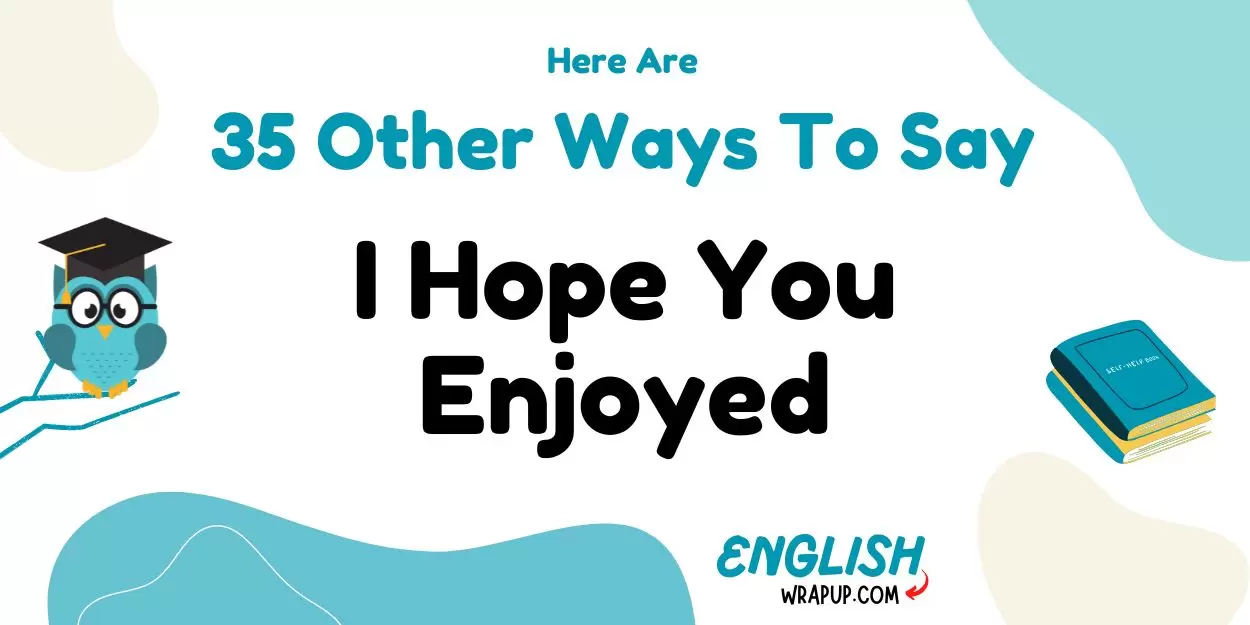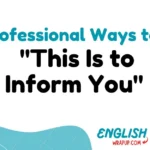Expressing the hope that someone enjoyed a particular experience is a courteous and thoughtful gesture. While “I Hope You Enjoyed” is a common phrase, there are numerous alternatives available to convey the same sentiment with warmth and sincerity.
Whether you’re reflecting on a shared event, a gift, or an experience, choosing the right phrase can convey your genuine wish for the other person’s happiness and satisfaction. Here are 35 alternative ways to express the sentiment “I Hope You Enjoyed”:
Is it Professional to Say “I Hope You Enjoyed”
Yes, saying “I hope you enjoyed” can be professional, particularly when used to express your desire for someone to have found value or satisfaction in an experience you provided, such as a presentation, event, or meeting. It’s a courteous and friendly way to conclude an interaction and convey your interest in the recipient’s experience. Here are some considerations:
- Politeness: It demonstrates politeness and consideration for the recipient’s enjoyment or satisfaction.
- Acknowledgment: It acknowledges the recipient’s participation or attendance and expresses your hope that they had a positive experience.
- Engagement: It fosters engagement and rapport by showing genuine interest in the recipient’s experience and well-being.
What to say instead of “I Hope You Enjoyed”
- I trust you had a good time.
- I hope it brought you pleasure.
- I trust it was enjoyable for you.
- I hope it was to your liking.
- I trust it brought you joy.
- I hope you found it delightful.
- I trust it was a positive experience.
- I hope it was satisfying for you.
- I trust it was enjoyable for you.
- I hope it brought you happiness.
- I trust it was pleasurable for you.
- I hope you found it enjoyable.
- I trust it was a source of pleasure for you.
- I hope it was a pleasant experience.
- I trust you had a good time with it.
- I hope you found it pleasing.
- I trust it brought you satisfaction.
- I hope it brought you contentment.
- I trust it was a fulfilling experience.
- I hope you derived pleasure from it.
- I trust it was to your satisfaction.
- I hope you found it satisfying.
- I trust it was a positive encounter for you.
- I hope you derived enjoyment from it.
- I trust it met your expectations.
- I hope it left you feeling content.
- I trust it was a source of joy for you.
- I hope it brought you delight.
- I trust it brought you happiness.
- I hope you found it fulfilling.
- I trust it brought you contentment.
- I hope you found it to your liking.
- I trust it was a good experience for you.
- I hope it brought you satisfaction.
- I trust it was a source of enjoyment for you.
1. I trust you had a good time.
“I trust you had a good time.” conveys confidence in the other person’s enjoyment of the experience and expresses a genuine hope for their happiness.
2. I hope it brought you pleasure.
“I hope it brought you pleasure.” expresses a sincere wish for the other person to have experienced joy or satisfaction from the event or experience.
3. I trust it was enjoyable for you.
“I trust it was enjoyable for you.” conveys trust in the other person’s enjoyment and expresses a genuine hope for their positive experience.

4. I hope it was to your liking.
“I hope it was to your liking.” expresses a sincere wish for the other person to have found the experience agreeable or enjoyable.
5. I trust it brought you joy.
“I trust it brought you joy.” conveys trust in the other person’s happiness and expresses a genuine hope for their positive emotional experience.
6. I hope you found it delightful.
“I hope you found it delightful.” expresses a sincere wish for the other person to have experienced pleasure or enjoyment from the event or experience.
7. I trust it was a positive experience.
“I trust it was a positive experience.” conveys confidence in the other person’s satisfaction and expresses a genuine hope for their positive outcome.
8. I hope it was satisfying for you.
“I hope it was satisfying for you.” expresses a sincere wish for the other person to have found the experience fulfilling or gratifying.
Other Ways To Say “Stay Tuned”
9. I trust it was enjoyable for you.
“I trust it was enjoyable for you.” conveys trust in the other person’s enjoyment and expresses a genuine hope for their positive experience.
10. I hope it brought you happiness.
“I hope it brought you happiness.” expresses a sincere wish for the other person to have experienced joy or contentment from the event or experience.
11. I trust it was pleasurable for you.
“I trust it was pleasurable for you.” conveys trust in the other person’s enjoyment and expresses a genuine hope for their positive experience.
12. I hope you found it enjoyable.
“I hope you found it enjoyable.” expresses a sincere wish for the other person to have experienced pleasure or satisfaction from the event or experience.
13. I trust it was a source of pleasure for you.
“I trust it was a source of pleasure for you.” conveys trust in the other person’s enjoyment and expresses a genuine hope for their positive emotional experience.
14. I hope it was a pleasant experience.
“I hope it was a pleasant experience.” expresses a sincere wish for the other person to have found the experience agreeable or enjoyable.
15. I trust you had a good time with it.
“I trust you had a good time with it.” conveys confidence in the other person’s enjoyment and expresses a genuine hope for their positive experience.
16. I hope you found it pleasing.
“I hope you found it pleasing.” expresses a sincere wish for the other person to have found the experience agreeable or enjoyable.
17. I trust it brought you satisfaction.
“I trust it brought you satisfaction.” conveys trust in the other person’s fulfillment and expresses a genuine hope for their positive outcome.
18. I hope it brought you contentment.
“I hope it brought you contentment.” expresses a sincere wish for the other person to have experienced peace or satisfaction from the event or experience.
19. I trust it was a fulfilling experience.
“I trust it was a fulfilling experience.” conveys trust in the other person’s sense of fulfillment and expresses a genuine hope for their positive outcome.
20. I hope you derived pleasure from it.
“I hope you derived pleasure from it.” expresses a sincere wish for the other person to have experienced enjoyment or satisfaction from the event or experience.
21. I trust it was to your satisfaction.
“I trust it was to your satisfaction.” conveys trust in the other person’s fulfillment and expresses a genuine hope for their positive outcome.
22. I hope you found it satisfying.
“I hope you found it satisfying.” expresses a sincere wish for the other person to have found the experience fulfilling or gratifying.
23. I trust it was a positive encounter for you.
“I trust it was a positive encounter for you.” conveys trust in the other person’s positive experience and expresses a genuine hope for their satisfaction.
24. I hope you derived enjoyment from it.
“I hope you derived enjoyment from it.” expresses a sincere wish for the other person to have experienced pleasure or satisfaction from the event or experience.

25. I trust it met your expectations.
“I trust it met your expectations.” conveys trust in the other person’s satisfaction and expresses a genuine hope for their positive outcome.
26. I hope it left you feeling content.
“I hope it left you feeling content.” expresses a sincere wish for the other person to have experienced peace or satisfaction from the event or experience.
27. I trust it was a source of joy for you.
“I trust it was a source of joy for you.” conveys trust in the other person’s happiness and expresses a genuine hope for their positive emotional experience.
28. I hope it brought you delight.
“I hope it brought you delight.” expresses a sincere wish for the other person to have experienced happiness or pleasure from the event or experience.
29. I trust it brought you happiness.
“I trust it brought you happiness.” conveys trust in the other person’s joy and expresses a genuine hope for their positive emotional experience.
30. I hope you found it fulfilling.
“I hope you found it fulfilling.” expresses a sincere wish for the other person to have found the experience satisfying or meaningful.
31. I trust it brought you contentment.
“I trust it brought you contentment.” conveys trust in the other person’s peace or satisfaction and expresses a genuine hope for their positive emotional experience.
32. I hope you found it to your liking.
“I hope you found it to your liking.” expresses a sincere wish for the other person to have found the experience agreeable or enjoyable.
33. I trust it was a good experience for you.
“I trust it was a good experience for you.” conveys trust in the other person’s positive experience and expresses a genuine hope for their satisfaction.
34. I hope it brought you satisfaction.
“I hope it brought you satisfaction.” expresses a sincere wish for the other person to have found the experience fulfilling or gratifying.
35. I trust it was a source of enjoyment for you.
“I trust it was a source of enjoyment for you.” conveys trust in the other person’s enjoyment and expresses a genuine hope for their positive emotional experience.
Final Thoughts
In conclusion, while “I Hope You Enjoyed” is a common expression to convey well wishes for someone’s experience, there are numerous alternatives available to express the same sentiment with sincerity and warmth.
Whether you’re reflecting on an event, a gift, or an experience shared with someone, choosing the right phrase can convey your genuine hope for their happiness and satisfaction. These alternatives offer versatility and clarity in expressing your desire for the other person to have had a positive and enjoyable experience.

I’m Noah Wilson, the test-prep pro at “English WRAP Up.” I’ve been helping students navigate the challenges of TOEFL, IELTS, BULATS, FCE, CAE, and PTEG, making the learning process a whole lot of fun. Over at English WRAP Up, we’re here to make your test prep incredible. Let’s wrap up your English exams with confidence and skill together!



